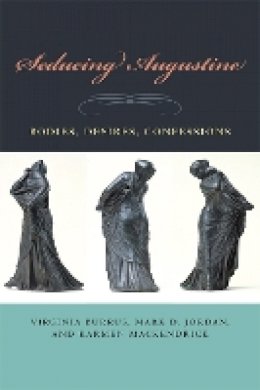
Seducing Augustine: Bodies, Desires, Confessions
Virginia Burrus
Augustine’s Confessions is a text that seduces. But how often do its readers respond in kind? Here three scholars who share a longstanding fascination with sexuality and Christian discourse attempt to do just that. Where prior interpreters have been inclined either to defend or to criticize Augustine’s views, Virginia Burrus, Mark Jordan, and Karmen MacKendrick set out both to seduce and to be seduced by his text.
Often ambivalent but always passionately engaged, their readings of the Confessions center on four sets of intertwined themes—secrecy and confession, asceticism and eroticism, constraint and freedom, and time and eternity. Rather than expose Augustine’s sexual history, they explore how the Confessions conjoins the erotic with the hidden, the imaginary, and the fictional. Rather than bemoan the repressiveness of his text, they uncover the complex relationship between seductive flesh and persuasive words that pervades all of its books. Rather than struggle to escape the control of the author, they embrace the painful pleasure of willed submission that lies at the erotic heart not only of the Confessions but also of Augustine’s broader understanding of sin and salvation. Rather than mourn the fateful otherworldliness of his theological
vision, they plumb the bottomless depths of beauty that Augustine discovers within creation, thereby extending desire precisely by refusing satisfaction.
In unfolding their readings, the authors draw upon other works in Augustine’s corpus while building on prior Augustinian scholarship in their own overlapping fields of history, theology, and philosophy.
They also press well beyond the conventional boundaries of scholarly disciplines, conversing with such wide-ranging theorists of eroticism as Barthes, Baudrillard, Klossowski, Foucault, and Harpham. In the end, they offer not only a fresh interpretation of Augustine’s famous work but also a multivocal literary-philosophical meditation on the seductive elusiveness of desire, bodies, language, and God.
Product Details
About Virginia Burrus
Reviews for Seducing Augustine: Bodies, Desires, Confessions
-Yvonne Sherwood University of Glasgow "Seducing Augustine is an intriguing, multidisciplinary reflection focused on a single passage in Augustine's Confessions ... Recommended." -Choice "A study of the Confessions that explores themes of secrecy and confession, eroticism, constraint and freedom, and time and eternity." -The Chronicle of Higher Education Has there yet been an interpretation of the Confessions so profoundly committed to delight? Augustine's delight in God, in the world, in language; the reader's delight in Augustine and his text; and perhaps - the daring inversion - God's own delight in our multifarious responses. Each of the three authors engages the Confessions from a different discipline, but each is moved by the humanity and fleshliness of Augustine and his work - and their emotion is made possible by their deep attention to the divine. Our own reading of the Confessions is expanded and enriched by this seductive volume.
-Catherine Conybeare author of The Irrational Augustine, Bryn Mawr College "This short, elegantly written book is the collective effort of three of the most provocative and insightful students of the fretful logic of Christian asceticism, where flesh is alternately mortified and resurrected to uncertain effect. They are variously but all well equipped to read and struggle with Augustine, an ancient virtuoso of such fretful logic. Seducing Augustine is cross-disciplinary in appeal and will play well in philosophy, theology, ethics, and religious studies-especially when historical perspective is being given its due."
-James Wetzel Villanova University "Augustine's legacy for sex in the West seems to have been deadly. And yet his texts, eminently the Confessions, are irresistibly seductive. Can he be seduced, so as to yield to and inspire desire? Seducing Augustine shows how he can indeed. Its triple authorship produces a plurality of performances that makes seduction about play itself rather than about accomplishing the deed. Can seduction substitute for sex? It can, if sex is about pleasure, the pleasure of the text, a pleasure in the seduction of words forming the body of the text, its flesh. The textual dynamics enacting ultimately the love of God are sexual in their seductive effects, producing pleasure in play that keeps desire alive with desiring what it longs for and cannot quite possess-except in the play itself that is realized textually. This desire is expressed in praise that excites passion for the divine other, the one addressed as "you." But to enjoy it, you must abandon all resistance and risk endless joy without reserve. The motivations of the whole tradition of Western literature, including the discourses of theology and philosophy, can hardly be grasped without taking into account the dynamics of desire deciphered in this book that seduces the saint. He is made to confess his seductiveness. It is a ravishing read!"
-William Franke author of Poetry and Apocalypse: Theological Disclosures of Poetic Language "Both seduced by Augustine's text and seducing it in return, as they themselves confess, the authors offer a provocative and enticingly fresh guide through Augustine's Confessions. Compelling and compellingly varied, their readings highlight the excess, paradox, and performative quality that mark the complex eroticism of Augustine's great work. This volume is a deeply insightful set of studies, well-theorized and thoroughly interdisciplinary."
-Patricia Cox Miller Syracuse University
